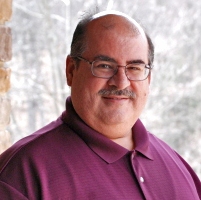by Noel Santiago
Leaders from Mosaic Partner in Ministry RIMI met in Mexico City from September 19-21, 2024. Coming from Mexico, the USA, Paraguay, Ecuador, Bolivia, and Colombia, they gathered for their annual meeting. RIMI is the Red de Iglesias Misioneras Internacionales (International Network of Missionary Churches). The meeting took place in an upper room at Iglesia Cristiana La Paz in Mexico City, one of the world’s largest cities.
The La Paz congregation was started by Franconia missionaries Kirk and Marilyn Hanger, along with Mennonite Brethren missionaries Jonathan and Juanis Pritchard from Kansas and Mexico. Leticia Cortes, who had worked with the Hangers at Palabra de Gozo church in Mexico City, helped start Iglesia Cristiana La Paz. Later, Leticia married Fernando, moved to the US, and together they now pastor Centro De Alabanza, a Mosaic member congregation in South Philadelphia.
Amid Mexico City’s noise—barking dogs, street vendors shouting, a constantly-ringing mini church bell used as a doorbell, and the sounds of cars, buses, motorcycles, and people— we had to focus hard on listening to make sure we heard each other clearly over the noise.
The purpose of this annual gathering was to worship, pray, and connect. Leaders shared ministry updates from each country, supported and prayed for one another, and planned how to best organize a growing and multiplying movement of churches, leaders, and groups.
The work involved reviewing RIMI’s mission and priorities to keep ministry aligned with its vision. The main challenge was creating a structure that stays organized and flexible without becoming rigid. Like Mosaic, they used pillar statements as part of their guiding principles and have focused them on missional discipleship; building lasting relationships; developing self-sustaining churches; sending called individuals to other cultures; starting and multiplying churches; and organizing in organic, life-giving ways.
The highlight of the meeting was hearing stories of God’s work in different countries, with people coming to faith in Jesus. One story involved a RIMI leader who was invited to speak at a community funeral. The family appreciated his message so much that they asked him to return a month later to share more from the Bible. Three months later, a Bible study group formed. Similar stories were shared from all the countries.

RIMI focuses on finding and empowering leaders with a vision for starting new churches or groups. When they identify such people, they come alongside them, and if agreeable to all involved, they start working together.
They accompany and equip pastors of established congregations and sponsor Generación Sana, an annual international youth gathering focused on raising up and empowering young people for ministry.
Many in these countries face challenges for ministry, including concerns about personal safety due to violence, travel uncertainties, and limited resources. Despite these obstacles, people shared stories of God’s faithfulness and how God supported them in their work.
A crucial part of RIMI’s leadership meetings is the intercessory team. In addition to being active members, they listen for how God is speaking and moving among them. Their insights are regularly sought during decision-making.
RIMI’s vision is to see people transformed by Christ to impact all nations. Their mission is to connect and multiply churches and ministries to fulfill God’s purpose. They value leaders who serve in underserved areas and who demonstrate healthy relationship skills, discipleship and empowerment, teamwork, and holistic ministry engagement.
Pastor Kirk Hanger sums up a central piece of RIMI’s as follows: “We provide mentoring, coaching, encouragement, training, and spiritual support to leaders as well as a network of people who share a common vision and commitment to Christ”.
In Mexico I was struck by the deep gratitude those present expressed for the opportunity to serve. Whether it was through preparing meals, ministering to one another, hosting guests, or running errands, their joy was truly evident. I pray I can capture a bit of this joy in my own heart as I seek to serve others.
God keeps inviting and expanding Mosaic’s reach across the world. May God continue using this church-planting network to share the good news of Jesus in our broken and beautiful world.


Noel Santiago
Noel Santiago is the Leadership Minister for Missional Transformation for Mosaic Conference.

















 one another. There was much singing together and the women enjoyed a delicious lunch including a wonderful cake gifted to them from MCUSA out-going Executive Director, Ervin Stutzman, from his retirement party the night before. It was bi-lingual day, with everything presented in English and Spanish, and was a deeply moving day, culminating in the women giving testimony as to where God had unfolded their darkness into light.
one another. There was much singing together and the women enjoyed a delicious lunch including a wonderful cake gifted to them from MCUSA out-going Executive Director, Ervin Stutzman, from his retirement party the night before. It was bi-lingual day, with everything presented in English and Spanish, and was a deeply moving day, culminating in the women giving testimony as to where God had unfolded their darkness into light.



